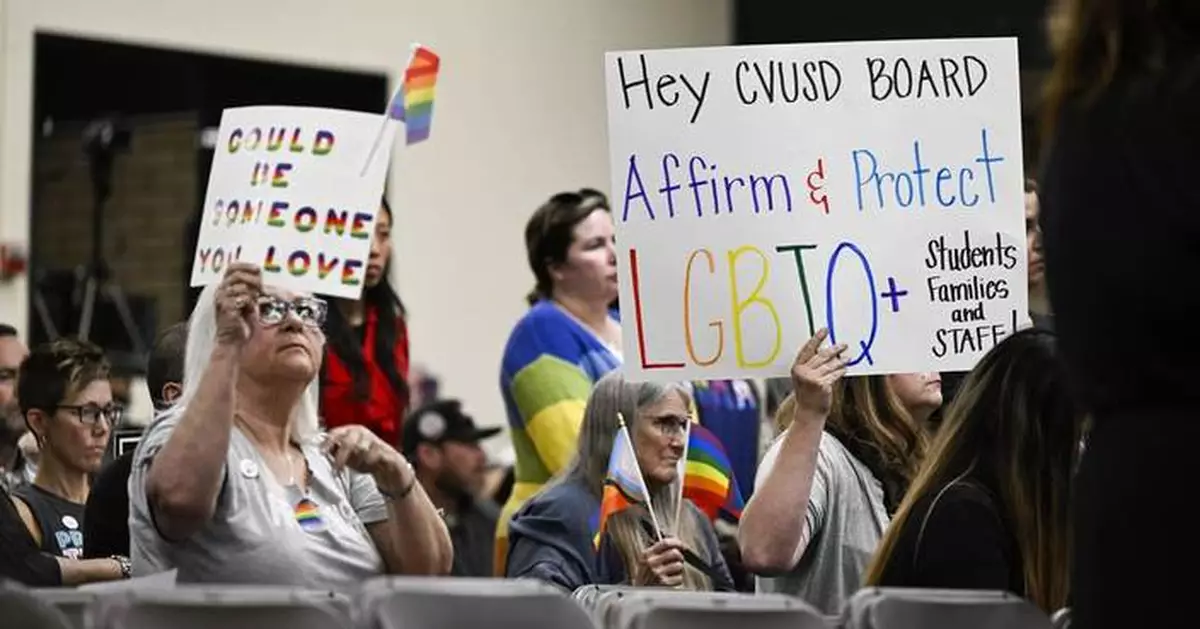SACRAMENTO, Calif. (AP) — The Trump administration launched an investigation Thursday into the California Department of Education over a law that says districts can't force teachers and staff to notify parents if a student changes their gender identity at school.
The U.S. Department of Education said the policy may violate the Family Educational Rights and Privacy Act, a law allowing parents to access their child's records.
“It is not only immoral but also potentially in contradiction with federal law for California schools to hide crucial information about a student’s wellbeing from parents and guardians," Education Secretary Linda McMahon said in a statement.
Democratic Gov. Gavin Newsom's office defended the law, saying parents still have the right to access their child's education records.
“If the U.S. Department of Education still had staff, this would be a quick investigation — all they would need to do is read the law the Governor signed,” Newsom spokesperson Elana Ross said in a statement, referencing Trump's plans to dismantle the agency.
Now, the Education Department says it could take away funding if it determines California’s school gender-identity law violates federal rules.
It bans school districts from adopting or enforcing rules that require staff to disclose information about a student’s sexual orientation, gender identity, or gender expression to any other person without the child’s consent, unless otherwise required by law. That means if a student wants to use different pronouns, the school can't force teachers to tell the students' parents. It does not prohibit teachers and school staff from choosing to share that information with parents.
Newsom signed the law last year, making California the first state to enact such a policy. It took effect Jan. 1.
The law also requires the state education department to develop resources to support LGBTQ+ students and their families.
A nationwide battle is underway over transgender rights, with some states imposing bans on gender-affirming care, barring trans athletes from girls and women’s sports, and requiring schools to share students' gender identity with parents without the students' consent.
Republican Assemblymember Bill Essayli introduced a bill in 2023 that would have required schools to notify parents within three days of a school employee becoming aware of a child's pronoun change.
Lawmakers in the Democratic-dominated Legislature blocked the bill from receiving a hearing, so school boards started to take up the issue and pass so-called parental notification policies of their own. The state started a legal battle with Chino Valley Unified School District, one of the first districts to enact such a rule, arguing the policy violated the rights of students and put the well-being of transgender children at risk.
The district later updated its rule to remove any mention of gender identification and require staff broadly to notify parents of any request their child makes for a change to their records.
Democratic Assemblymember Chris Ward, chair of the legislative LGBTQ+ caucus, introduced the bill largely in response to the school district policies. It passed on party lines.
The goal is to protect the privacy of students, some of whom may live in unaccepting households and are not ready to tell their parents, backers say. Teachers should not be required to get involved in family discussions about a student’s gender identity, they argue.
“Requiring governmental school officials to expose them without their consent runs afoul of the US Constitution," Ward said in a statement, calling such policies “immorally invasive.”
David Goldberg, president of the California Teachers Association, said the law helps ensure students have a safe and supportive learning environment.
Critics of the law say parents should be able to know if their child changes their gender identification at school. Chino Valley Unified sued the state over the policy, arguing it violated parents' rights under the U.S. Constitution.
“I would like to get very clear guidance to school districts that they absolutely should not have policies keeping secrets from parents,” said Jonathan Zachreson, a Roseville City School District board member.
The Trump administration said children are at risk of falling victim to “radical transgender ideology” and medical interventions.
Trump set the tone on his administration’s stance on issues affecting transgender and nonbinary people during his first days back in office. He signed executive orders to restrict gender-affirming care for minors and transgender athletes’ participation in girls sports.
Newsom has also been in the spotlight for his position on trans rights after he said on his podcast that transgender athletes’ participation in girls sports was unfair. California has a state law, signed in 2013 by then-Gov. Jerry Brown, allowing students to participate on a sex-segregated sports team that aligns with their gender identity, regardless of the gender listed on the student’s records. A Republican bill seeks to reverse it; Newsom hasn't taken a position.
The Trump administration also sent a letter Thursday requesting the state to submit curricula and materials from a sexual health education program that receives federal funding. The U.S. Department of Health and Human Services will review whether the materials are “medically accurate” and “age-appropriate”, the letter said.
This story was first published on March 27, 2025. It was updated on March 28, 2025, to correct the headline to show the investigation is by the federal government, not the White House.
Austin is a corps member for The Associated Press/Report for America Statehouse News Initiative. Report for America is a nonprofit national service program that places journalists in local newsrooms to report on undercovered issues. Follow Austin on X: @sophieadanna
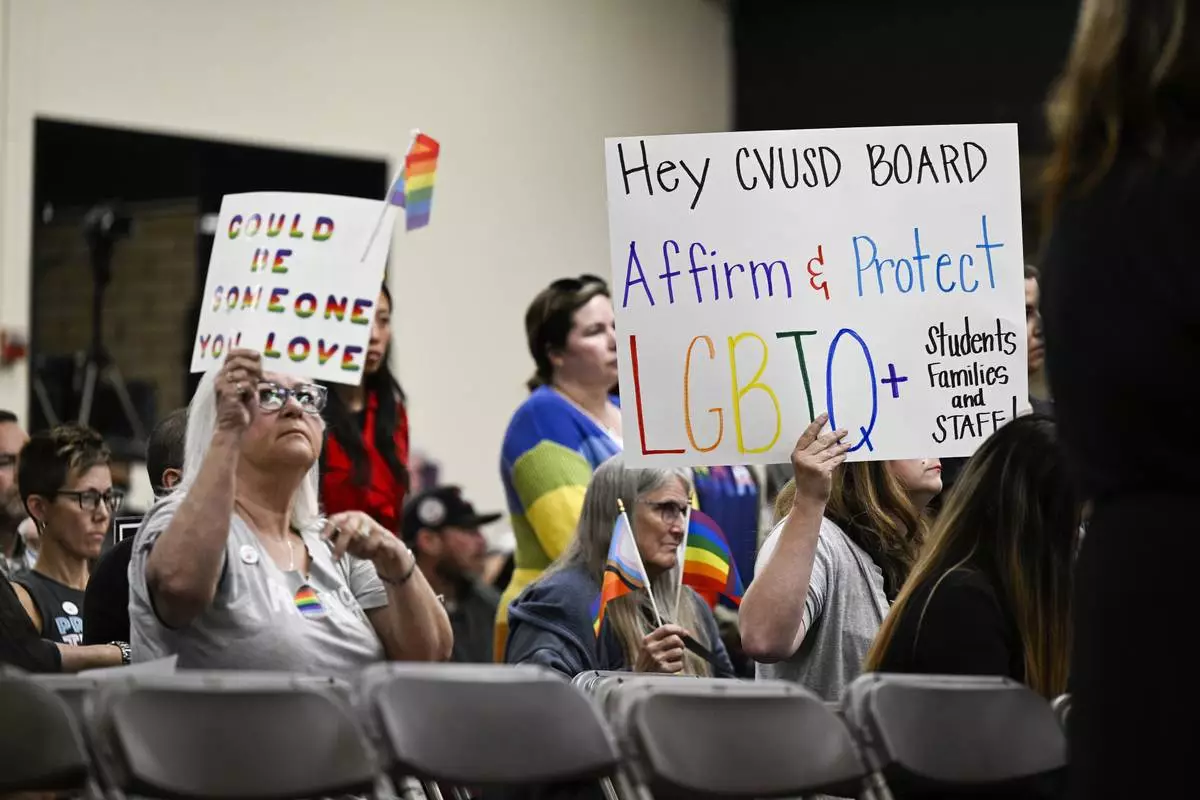
FILE - Parents, students, and staff of Chino Valley Unified School District hold up signs in favor of protecting LGBTQ+ policies at Don Antonio Lugo High School, in Chino, Calif., June 15, 2023. (Anjali Sharif-Paul/The Orange County Register via AP, File)
On the campaign trail, Donald Trump used contentiousness around transgender people's access to sports and bathrooms to fire up conservative voters and sway undecideds. And in his first months back in office, Trump has pushed the issue further, erasing mention of transgender people on government websites and passports and trying to remove them from the military.
It’s a contradiction of numbers that reveals a deep cultural divide: Transgender people make up less than 1% of the U.S. population, but they have become a major piece on the political chess board — particularly Trump’s.
For transgender people and their allies — along with several judges who have ruled against Trump in response to legal challenges — it’s a matter of civil rights for a small group. But many Americans believe those rights had grown too expansive.
The president's spotlight is giving Monday's Transgender Day of Visibility a different tenor this year.
“What he wants is to scare us into being invisible again,” said Rachel Crandall Crocker, the executive director of Transgender Michigan who organized the first Day of Visibility 16 years ago. “We have to show him we won’t go back.”
So why has this small population found itself with such an outsized role in American politics?
Trump's actions reflect a constellation of beliefs that transgender people are dangerous, are men trying to get access to women's spaces or are pushed into gender changes that they will later regret.
The American Academy of Pediatrics, the American Medical Association and other major medical groups have said that gender-affirming treatments can be medically necessary and are supported by evidence.
Zein Murib, an associate professor of political science and women’s, gender and sexuality studies at Fordham University, said there has been a decades-old effort “to reinstate Christian nationalist principles as the law of the land” that increased its focus on transgender people after a 2015 U.S. Supreme Court ruling recognizing same-sex marriage nationwide. It took a few years, but some of the positions gained traction.
One factor: Proponents of the restrictions lean into broader questions of fairness and safety, which draw more public attention.
Sports bans and bathroom laws are linked to protecting spaces for women and girls, even as studies have found transgender women are far more likely to be victims of violence. Efforts to bar schools from encouraging gender transition are connected to protecting parental rights. And bans on gender-affirming care rely partly on the idea that people might later regret it, though studies have found that to be rare.
Since 2020, about half the states passed laws barring transgender people from sports competitions aligning with their gender and have banned or restricted gender-affirming medical care for minors. At least 14 have adopted laws restricting which bathrooms transgender people can use in certain buildings.
In February, Iowa became the first state to remove protections for transgender people from civil rights law.
It's not just political gamesmanship. “I think that whether or not that’s a politically viable strategy is second to the immediate impact that that is going to have on trans people," Fordham’s Murib said.
More than half of voters in the 2024 election — 55% — said support for transgender rights in the United States has gone too far, according to AP VoteCast. About 2 in 10 said the level of support has been about right, and a similar share said support hasn’t gone far enough.
Nevertheless, AP VoteCast also found voters were split on laws banning gender-affirming medical treatment, such as puberty blockers or hormone therapy, for minors. Just over half were opposed to these laws, while just under half were in favor.
Trump voters were overwhelmingly likely to say support for transgender rights has gone too far, while Kamala Harris' voters were more divided. About 4 in 10 Harris voters said support for transgender rights has not gone far enough, while 36% said it’s been about right and about one-quarter said it’s gone too far.
A survey this year from the Pew Research Center found Americans, including Democrats, have become more slightly more supportive of requiring transgender athletes to compete on teams that match their sex at birth and more supportive on bans on gender-affirming medical care for transgender minors since 2022. Most Democrats still oppose those kinds of measures, though.
Leor Sapir, a fellow at Manhattan Institute, a right-leaning think tank, says Trump's and Republicans' positions have given them a political edge.
“They are putting their opponents, their Democratic opponents, in a very unfavorable position by having to decide between catering to their progressive, activist base or their median voter,” he said.
Not everyone agrees.
“People across the political spectrum agree that in fact, the major crises and major problems facing the United States right now is not the existence and civic participation of trans people,” said Olivia Hunt, director of federal policy for Advocates for Trans Equality.
And in the same election that saw Trump return to the presidency, Delaware voters elected Sarah McBride, the first transgender member of Congress.
Paisley Currah, a political science professor at the City University of New York, said conservatives go after transgender people in part because they make up such a small portion of the population.
“Because it’s so small, it’s relatively unknown,” said Currah, who is transgender. “And then Trump has kind of used trans to signify what’s wrong with the left. You know: ‘It’s just too crazy. It’s too woke.’”
But Democratic politicians also know the population is relatively small, said Seth Masket, director of the Center on American Politics at the University of Denver, who is writing a book about the GOP.
“A lot of Democrats are not particularly fired up to defend this group,” Masket said, citing polling.
For Republicans, the overall support of transgender rights is evidence they are out of step with the times.
“The Democrat Party continues to find themselves on the wrong side of overwhelmingly popular issues, and it proves just how out of touch they are with Americans," National Republican Congressional Committee spokesperson Mike Marinella said.
Some of that message may be getting through. In early March, California Gov. Gavin Newsom, a potential 2028 Democratic presidential candidate, launched his new podcast by speaking out against allowing transgender women and girls competing in women’s and girls sports.
And several other Democratic officials have said the party spends too much effort supporting transgender rights. Others, including U.S. Sen. Catherine Cortez Masto, have said they oppose transgender athletes in girls and women’s sports.
Jay Jones, the student government president at Howard University and a transgender woman, said her peers are largely accepting of transgender people.
“The Trump administration is trying to weaponize people of the trans experience … to help give an archenemy or a scapegoat,” she said. But “I don’t think that is going to be as successful as the strategy as he thinks that it will be.”
Associated Press polling editor Amelia Thomson-DeVeaux contributed to this article. Jesse Bedayn is a corps member for the Associated Press/Report for America Statehouse News Initiative. Report for America is a nonprofit national service program that places journalists in local newsrooms to report on undercovered issues.
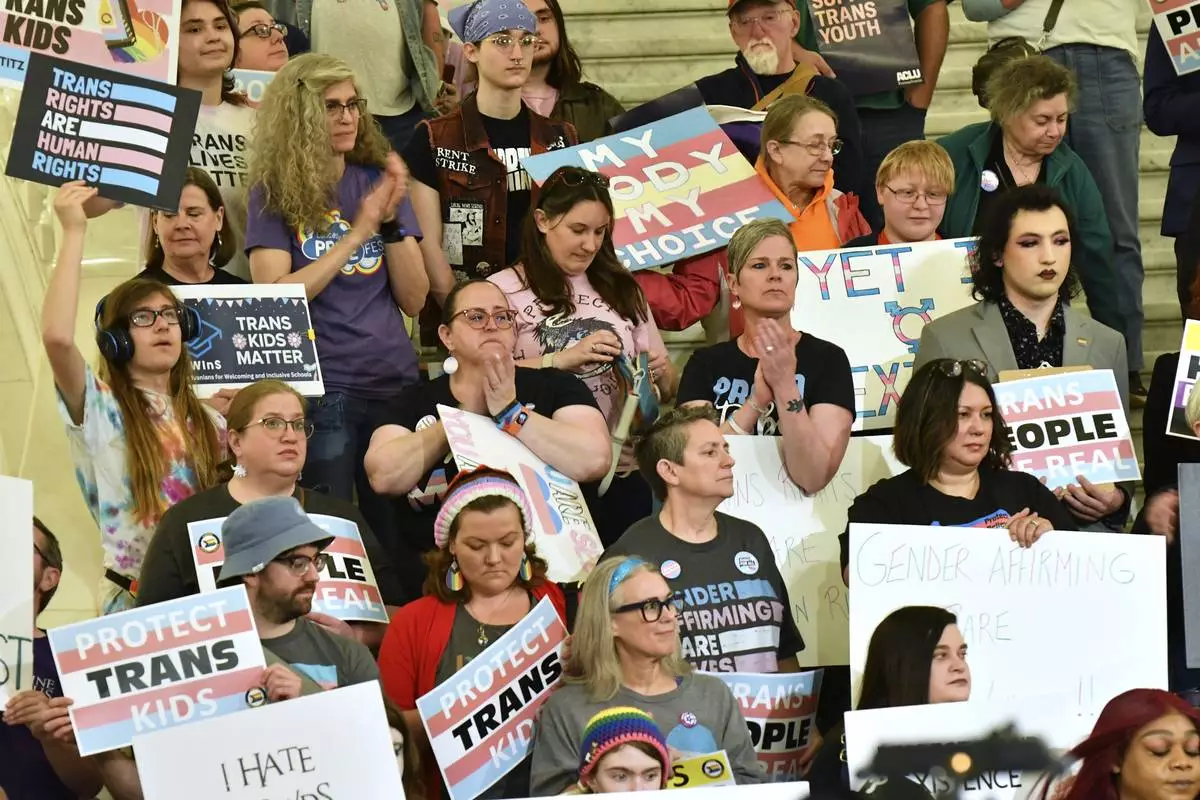
Demonstrators on Transgender Day of Visibility rally at the Pennsylvania Capitol, Monday, March 31, 2025, in Harrisburg, Pa. (AP Photo/Marc Levy)
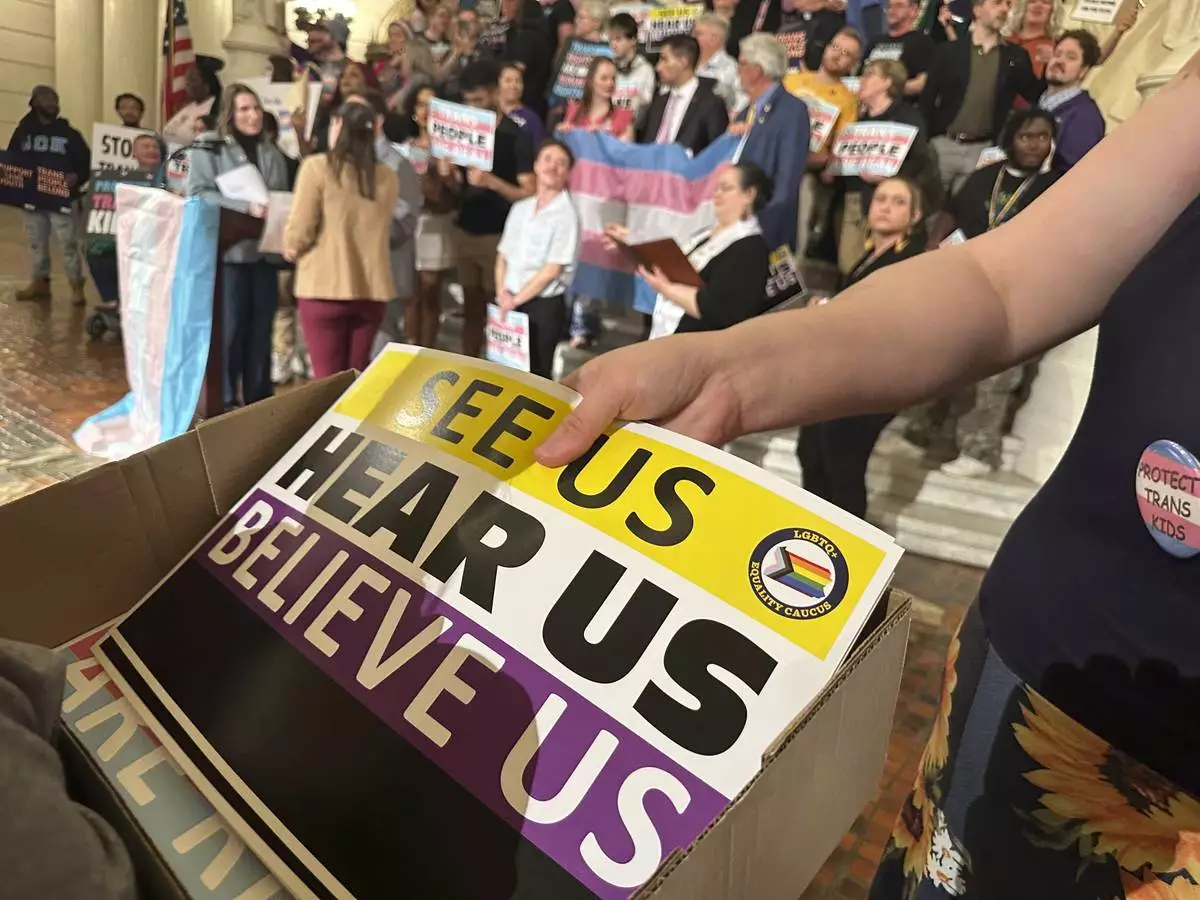
Participants in the Trans Day of Visibility rally in the Pennsylvania Capitol Rotunda in Harrisburg, Pa., on Monday, March 31, 2025. (AP Photo/Mark Scolforo)

FILE - A protester is silhouetted against a trans pride flag during a pro-transgender rights protest outside of Seattle Children's Hospital, Feb. 9, 2025, in Seattle. (AP Photo/Lindsey Wasson, file)
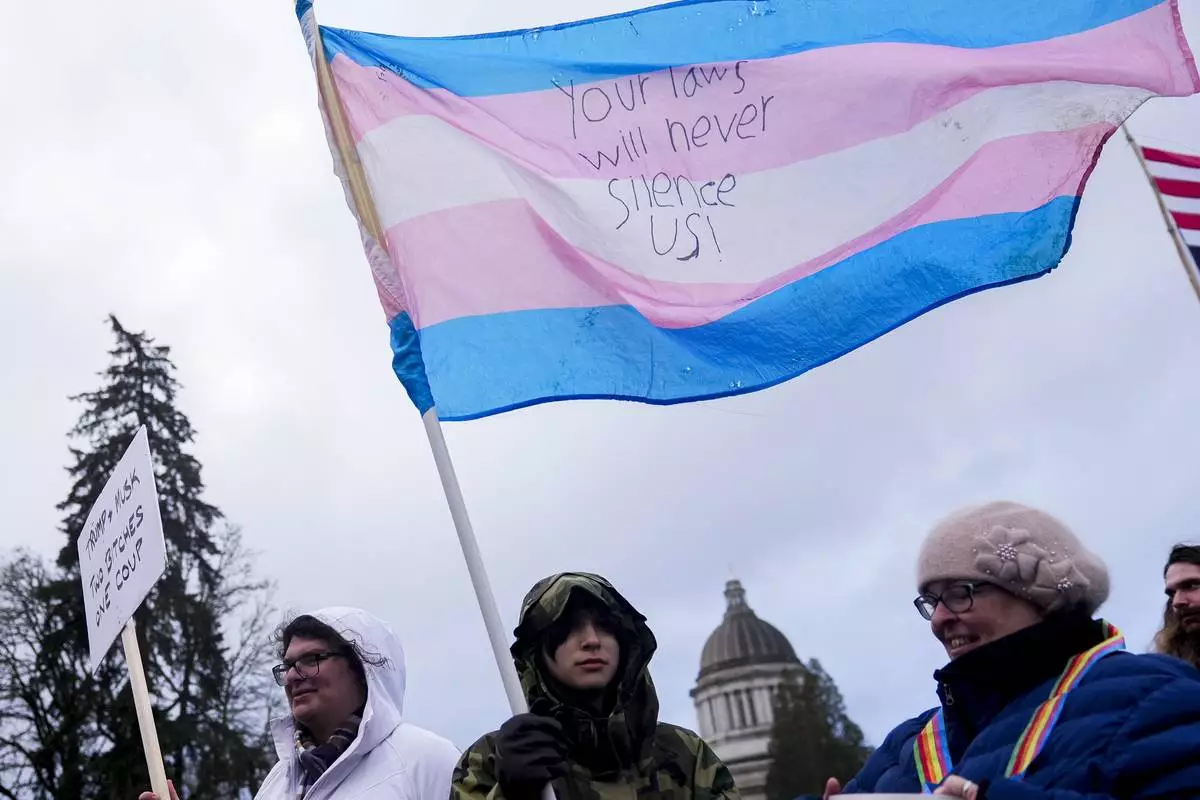
FILE - Liv Y., center, holds a transgender pride flag as people gather to protest against the Trump administration and Project 2025 near the Washington State Capitol building, Feb. 5, 2025, in Olympia, Wash. (AP Photo/Lindsey Wasson, File)

FILE - President Donald Trump signs an executive order barring transgender female athletes from competing in women's or girls' sporting events, in the East Room of the White House, Feb. 5, 2025, in Washington. (AP Photo/Alex Brandon, file)

FILE - Gene Sorensen holds up a transgender flag in front of the Nebraska state Capitol during a Transgender Day of Visibility rally, March 31, 2023, in Lincoln, Neb. (Larry Robinson/Lincoln Journal Star via AP, file)



